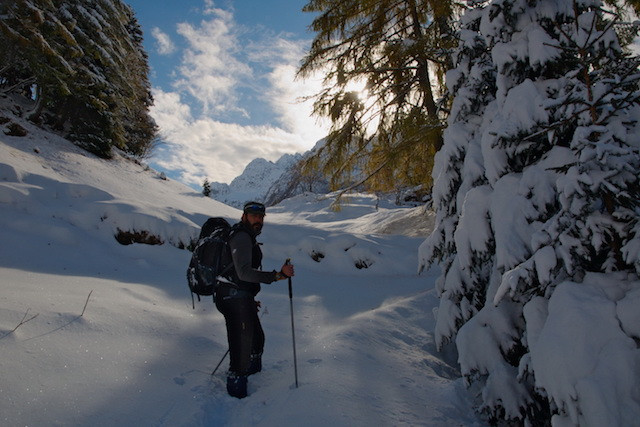Geopoetics is growing internationally. It seeks a renewed sense of one’s surroundings and reconnection with the natural environment and express that through different ways, such as writing, oral expression and other art forms. The movement, however, is open to individual interpretation, and American writers Henry David Thoreau and Barry Lopez are often cited as inspirations.
Davide Sapienza has lived in the Alpi Orobie (Bergamo Alps) since 1990, which inspires his literary vision. “Walking is the most basic and natural human tool to experience the world,” he says. “It’s like breathing.”
Walking and travelling also help shift Sapienza’s way of thinking: “I would really exit time in the way we [perceive it] to enter a ‘space’ that was also a real, actual place where I could…grow and mature ideas.”
A geopoet, journalist and translator of works by classic writers (Jack London and Edgar Allen Poe, to name a couple), Sapienza says “I never really thought that…sitting down in a library or bookstore would suffice and satisfy my need,” preferring instead “the geopoetic way of gathering and describing the relationship between imagination, culture and landscape.”
“Geography doesn’t lie”
In November 2014, Sapienza was invited by Luxembourger Robert Weis, an avid hiker, to try a geopoetic walk in the Mullerthall to launch Sapienza’s book “Camminando” (“Walking”). Weis later joined him on a geopoetic week in South Tirol, and he organised the 17 September walk and dinner.
The geopoetic hike in the Mullerthal, 2014 Photo: Ippolita Buttiglione
“I’ve been in Luxembourg City the last 20 years, and you can have days where you love it or hate it,” Weis said. “But the geopoetic walk gives you a new experience of the city. I’m still discovering new views and paths. It’s a new way of thinking that can be quite amazing.”
Weis, says Sapienza, “knows all my books, and therefore I have completely trusted his vision”. Throughout the walk, Sapienza will choose literary fragments to read in Italian and English to help others connect to the surroundings.
Sapienza says that although he is Italian and feels strongly connected to his mother country’s rich history, “I also feel an equally strong and powerful link with a world without borders and nations and artificial distinctions.” He adds: “Each culture is the product of a history and history is the product of the geography. History can lie, geography cannot. This is why I love this ‘geo’ idea, the poetics of geography to me are all inclusive.”
For more information about the Luxembourg geopoetic walk or dinner, visit the Facebook event page or email [email protected]

